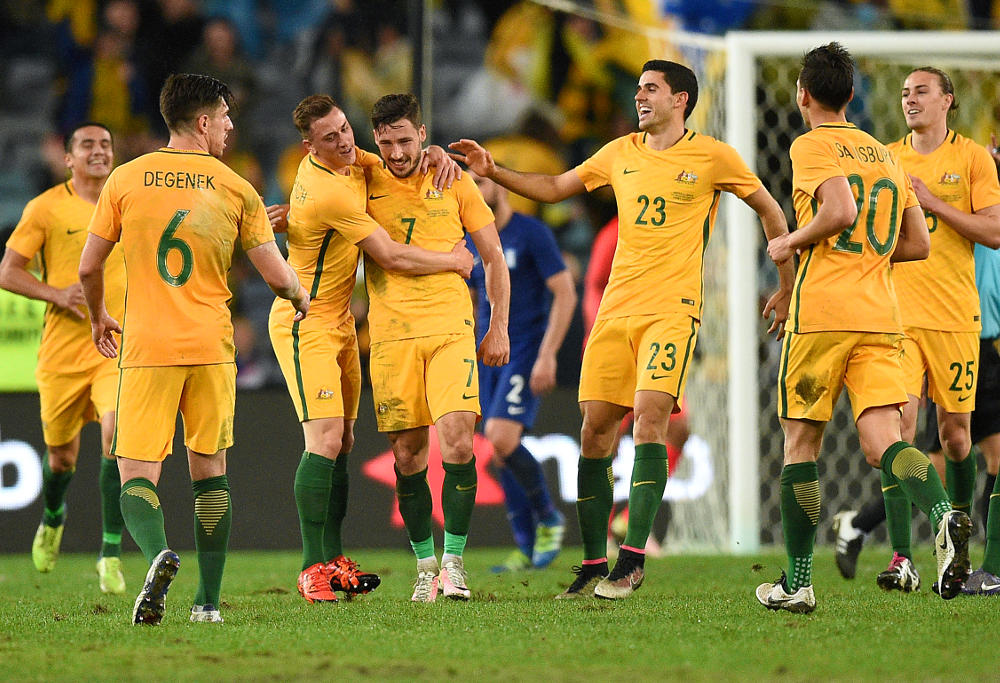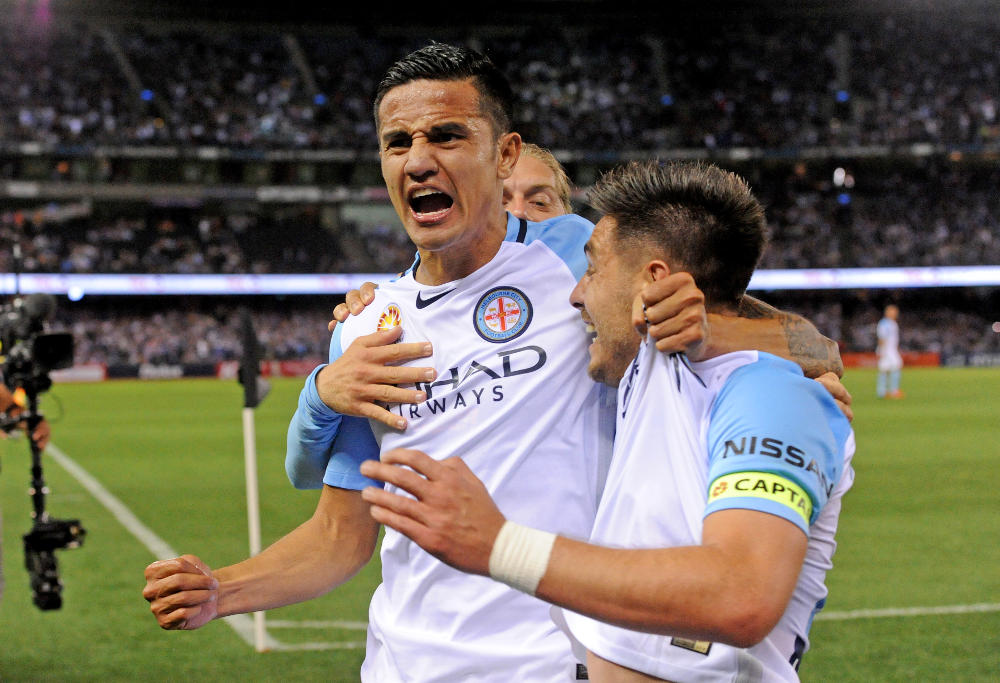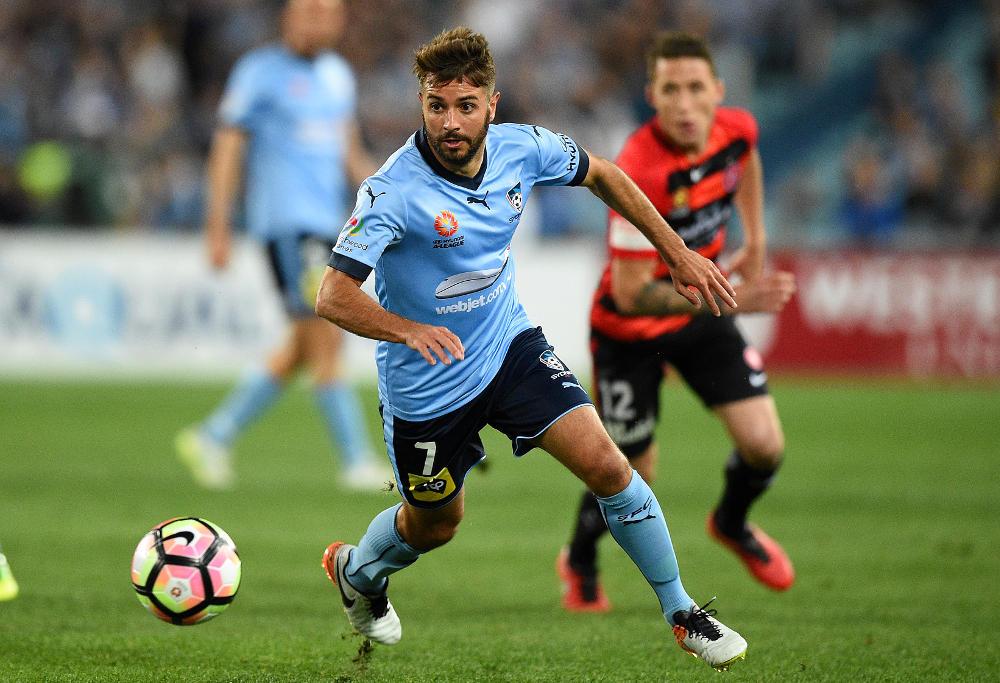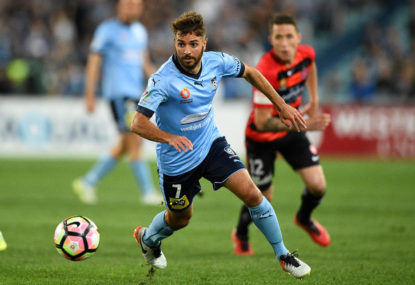In another and hopefully not forlorn attempt to embrace positivity and celebrate football in Australia, I was thinking about some of the language, phrases and words used on the pitch and in general football dialogue.
When one strolls past a busy park where numerous matches are underway, various words are bellowed repeatedly by players, managers and supporters. They are part of the beautiful lexicon of football and sport more widely.
1. Out
The professional, clinical and methodical effectiveness of the Sydney FC defence has perhaps been the standout feature of the A-League so far this season and the word ‘out’ has no doubt played a key part.
While they have scored a substantial amount of goals, it is the Sky Blues’ stinginess in defence that has built the remarkable for and against record they currently boast (36-7). Their success is based on the consistent shape and coordination of the back four that works as a unit like few others in the league.
The word ‘out’ still gives me nightmares, where an angry keeper urges me to push forward after a speedy left winger has driven me deep into the corner near the byline. Somehow I manage to stick a foot in and repel the attack, only to be abused and screamed at as the ball is cleared.
Ultimately, it is still one of the most crucial and fundamental parts of defending.
And it’s something Sydney are capitalising on frequently with their high press.
2. Width
To me, this is the key to football. The more narrow an attack gets, the more compact a defence can become, increasing the skill required to thread the needle.
While Diego Maradona, Lionel Messi and other geniuses might possess the freakish skill in traffic to overcome any defence, mere mortals are far better served creating width and aggressively attacking the byline.
The Asian cup winning goal by James Troisi came from this simple yet effective tactic.
Coaching my teams, I make it a mantra by which I will stand until proven otherwise.
3. Qualify
Whether we like it or not, this word is one of the key elements to the continued growth of football in this country. To state the obvious, being a competing nation in the last three World Cups has undoubtedly been a factor in the continued growth of the game.
The Socceroos will always play a pivotal role in achieving a crossover between the more traditional football supporter base and the more expectant mainstream fans who want the nation to be a footballing success, yet will jump ship if not given the success they demand.

This is not necessarily a bad thing. Some sense of ruthlessness and cut throat expectation can be healthy.
In fact, it’s the essence of the qualifiers themselves.
The Socceroos’ current campaign hangs on a knife’s edge and a trip to Russia in 2018 will be the FFA’s dream for the team, who remain the jewel in the crown.
4. Tim
After a storied career, Tim Cahill returned to our shores, with some reserved about his ability to produce.
No one would ever question his talent, yet there was much discussion about his age (37) and ability to continue to produce goals.
Once again, Cahill has shown everyone, with seven goals in 14 games, that he is indeed as effective as ever in terms of goal production. We are lucky to have witnessed his career and should never underestimate the contribution he has made and will make, to football in this country.

The way fellow players talk about his commitment to training, as well as the lessons he is able to pass on from his years of top-flight experience in England, we need to realise that we might not see another of his kind for quite a while.
5. Sir
Something that would serve the A-League well would be to set a model example for all football nations by reigniting a sense of respect and courtesy for the man (and soon to be woman) with the whistle.
I know it’s a little corny and altruistic to suggest, yet we all know that the number of young people keen to pursue careers as officials is negatively affected by the treatment they receive in the line of duty.
Recent A-League events, suspensions and ejections have highlighted the need to encourage respect and courtesy within the treatment of referees.
There is no doubt that the sins of the pros are emulated by the youth who wish to be just like their heroes.
A few years ago my left back, slow of foot and completely outplayed by a talented attacking right winger, managed to shepherd a ball over the sideline under immense pressure.
His reaction, despite being on the losing side of the ledger was to turn to the opposition parents, who felt his actions might have warranted a free, and hold his first finger to his lips and ‘hush’ them all.
I benched him immediately, out of disgust that a 14-year-old could have the arrogance to address adults in such a manner.
Standing in as a referee during matches has also shown me how young footballers address the official in the same manner as their heroes.
I, for one, would like to see far more respect for the referees. Watching A-League players run screaming at officials, with f-bombs launched at the rate of scud missiles during the gulf war, is a bad look.
Coaches letting rip at fourth officials and spitting abuse at each other does nothing for the game either.
It would be nice if the FFA decided to take a stand and set an example for modern football, by becoming a league that discourages and punishes players and coaches for disrespecting the hard working officials, who try their darnedest to get decisions correct yet are hampered by normal human failings.
Something tells me this is a pipe dream, yet stranger things have happened. Australia has had a history of doing things a little better than many other countries when it comes to big events and setting world standards.
We produced the best Olympic games and pioneered equal prize money for women in tennis.
6. Derby
Through crowd figures, it’s obvious how successful these matches have been over the course of the relatively young A-League’s history.

The Sydney version has taken things to a new level, yet the Melbourne encounter still has a level of spice that is special.
The Adelaide United versus Victory ‘original’ derby still produces, while the M1/F3 match still has a distinct feel.
Building these rivalries over a long period of time is key to developing passion in the A-League.
Watching the Celtic v Rangers clash a few weeks back at Ibrox, I was trying to explain to my two girls what it meant.
Floundering for words to articulate the long history and rivalry, I resorted to something with which they would be more familiar.
“It’s like Sydney FC versus the Wanderers but it’s been going on a lot longer.”
This is undoubtedly a candidate for the biggest understatement and most appalling piece of parenting of all time.
However, who knows where we stand in ten, fifteen or twenty years. Are we playing matches in from of fifteen to twenty thousand each week?
Are the Socceroos consistently a top thirty nation in the rankings? Is Tim Cahill managing the team and producing the same miracles he did as a player?
Is Mark Bosnich the doyen of Australian football commentary, adored and respected by a bunch of cheeky young co-commentators such as Jamie Maclaren, Aaron Mooy and Tom Rogic?
Who really knows where we will be.
The journey will be fun, but right now there are some pretty important words in football. Some old, some new, and I’m sure I’ve missed a few.
































































































